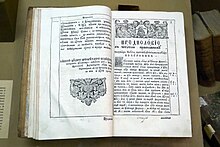Patericon

Patericon or paterikon (Greek: πατερικόν), a short form for πατερικόν βιβλίον ("father's book", usually Lives of the Fathers in English), is a genre of Byzantine literature of religious character, which were collections of sayings of saints, martyrs and hierarchs, and tales about them. These texts also have their roots in early monasticism.[1]
Among the earliest collections of this kind are the Αποφθέγματα των άγίων γερόντων (Apophthegmata of Saint Elders, also known as the Alphabetical Patericon,
In
Some paterica
- Valaam Patericon, a paterikon of the Valaam Monastery [3]
- Romanian Patericon [4] ISBN 978-0-938635-97-0
- Serbian Patericon [5] ISBN 978-0-938635-75-8
- Scete Patericon, an early Slavonic translation of Apophthegmata Patrum
- Kievan Cave Patericon, a paterikon of the Kiev Cave Monastery (13th century), uk:Патерик Києво-Печерський
- Volokolamsk Patericon' (16th century)
See also
- Synaxarion
- Patristics
- Kiev Patericon reference to St. Mark of the Caves
References
- ^ ISBN 9789004209534.
- ^ ISBN 9780810878457.
- Harmless, William (2004). Desert Christians: An Introduction to the Literature of Early Monasticism. ISBN 978-0-19-516223-3.
